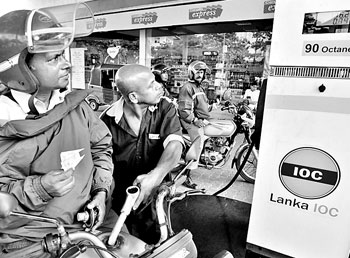As heavyweight Indian officials held secret talks in Colombo, top officials of the Lanka-Indian Oil Company (LIOC) held an emergency meeting yesterday at company headquarters in India, following threats by the government of Sri Lanka to take over some 150 LIOC filling stations in a dispute over the price of diesel.
On Thursday, Petroleum Minister A.H.M. Fowzie warned in parliament the government would take over LIOC fuel stations in Sri Lanka if the Indian company did not fall in line with the price structure of the Ceylon Petroleum Corporation.
 |
| Motor cyclist looks at the metre while topping up on fuel |
Diesel is being sold at CPC stations at Rs. 120 a litre while LIOC stations are selling diesel at Rs. 130. As the diesel price is heavily subsidized almost all vehicles are going to CPC stations for their diesel and therefore the CPC and the Sri Lankan government are bearing all the losses from the subsidy.
However LIOC Managing Director K. Ramakrishnan, speaking to The Sunday Times by telephone from India where he was attending the LIOC emergency meeting, said according to an amended agreement reached in 2006 with the Sri Lanka government, free pricing was permitted and thus the LIOC had the right to fix its own price for diesel or other fuel.
Mr. Fowzie told parliament he had conveyed to the LIOC the government’s decision to takeover LIOC filling stations if it did not adjust its diesel price. But Mr. Ramakrishnan said no such request or demand had been made in writing.
“We received a letter from the Petroleum Minister but there was nothing mentioned about taking over our filling stations,” he claimed. Asked what LIOC would do if price consraints were imposed, Mr. Ramakrishnan said the LIOC had no intention of pulling out as the company had long-term interests such as expansion of retail marketing of petroleum products, bulk supply to industrial customers, and building and operating storage facilities at the Trincomalee oil tank farm. He said the company was willing to adjust its diesel price as requested by the Minister but was constrained by the government’s imposition of a import duty on oil.
“The burden on account of the additional duty imposed by the government on the LIOC amounts to Rs.4.4 billion a year. In such a situation, it is extremely difficult to survive.
The CPC gets a benefit of Rs.6 billion a year as 50 percent of its petroleum products are processed within the country whereas all LIOC products are imported,” he said.
The LIOC chief said his company would request the government to relax the import tax of Rs. 24.50 a litre on refined fuel if the LIOC is to consider reducing its diesel prices. Mr. Ramakrishnan said LIOC stations in Sri Lanka had stopped selling kerosene because it was unprofitable to do so.
The LIOC currently owns some 150 filling stations around the country.
Mr. Ramakrishnan claimed that there was no legal way in which LIOC stations could be acquired by the government as they were the legal property of the Indian company.
Meanwhile, Minister Fowzie in response said he was concerned about the burden placed on the people and the CPC by the LIOC selling its diesel at a higher price. “We are losing Rs. 400 million a month because LIOC customers are now turning to the cheaper option which is the CPC diesel,” he said.
However, the minister admitted there was the agreement between the LIOC and the government which did not permit the state to take over the LIOC stations or force the Indian company to sell its fuel at the same price as the CPC.
He said it would be possible to amend the agreement and take over the LIOC sheds but the Ministry was employing another strategy to pressurise the LIOC to cooperate, but he would not disclose details now.
He said that if the LIOC wanted the government to remove or relax taxes on the import of refined oil or oil products, it should take up the matter with the Finance Ministry. |

